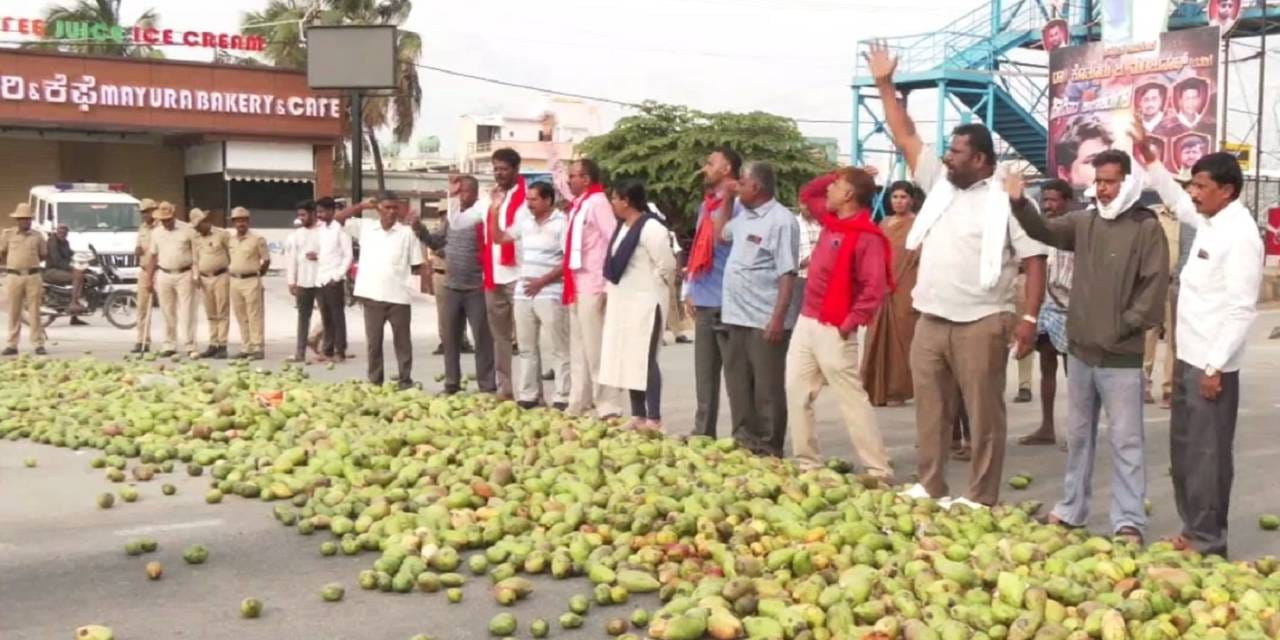Despite a bumper harvest, mango farmers in Tamil Nadu face a crisis as pulp factories refused procurement, exports collapsed, and systemic issues left cultivators stranded.
August 2025: The mango season has ended in Tamil Nadu, but its bitter aftertaste lingers for farmers. Despite a bumper harvest, thousands of cultivators were left distraught as their produce lay unsold, prices crashed to rock bottom, and systemic issues once again resurfaced without resolution.
This summer, mango farmers, usually far removed from media attention, briefly occupied headlines when images of them dumping truckloads of fruit on roads surfaced. For weeks in June, desperation forced cultivators to highlight their plight: pulp-making companies, their primary buyers, either refused to procure fruit or offered meagre rates of just ₹1-5 per kg.
A Season of Despair
In Vellore’s Paradarami, farmer NT Bharat stood by heaps of rotting mangoes. “Officials promised a solution, but when? Our fruits are already spoiled. If someone has a heart attack, do we wait to act?” he asked in frustration.
For others, discarding fruit was cheaper than attempting sales. “Transport, cleaning, and labour cost at least ₹1 per kg. If companies don’t even pay ₹5, it makes no sense,” said K Murugan from Dharmapuri. Meanwhile, R Venkatesan of Katpadi waited for days outside a Chittoor pulp factory with a tractor-load of fruit. “The mangoes are rotting as we speak. It’s heartbreaking,” he said in June.
As discontent rose and opposition parties raised the issue, the state government convened pulp factory owners on June 16, urging them to buy from farmers. Nothing changed. A week later, Chief Minister M.K. Stalin wrote to Prime Minister Narendra Modi and Union Agriculture Minister Shivraj Singh Chouhan seeking the implementation of the Market Intervention Scheme, requesting compensation through Price Deficiency Payments (PDP), similar to relief extended in Andhra Pradesh. Food Minister R. Sakkarapani even met Chouhan in Delhi with the plea. But no assistance came.
By July, the mango season wound down, the fruit vanished from kitchens, and farmers receded from public memory, left to cope with heavy losses and mounting debt.
The Larger Problem
Mangoes are harvested just three months a year, but the structural issues farmers face are perennial. Their dependence on a handful of pulp factories, the dominance of middlemen, low productivity, vulnerability to pests, lack of exposure to exports, limited varietal diversification, and absence of guidance on value addition leave them exposed to recurring crises.
Officials initially cited overproduction as this year’s cause for the glut. But the deeper reason lay elsewhere: pulp factories — concentrated mainly in Krishnagiri — were already saddled with unsold stock from previous years. Mango pulp, which has a two-year shelf life, had piled up due to shrinking demand in export markets, worsened by the Russia-Ukraine war and conflicts in West Asia.
Factories Under Pressure
P. Kanagaraj, managing director of Sri Samundeeswari Food Products Pvt Ltd in Tirupattur, has seen steady profits since 2007, except in the last two years. Normally, 80% of his pulp is exported and 20% sold to Indian FMCG companies. But geopolitical disruptions left nearly 1,000 tonnes unsold, causing losses of ₹10 crore.
While factories offered farmers ₹15 per kg in 2023 and ₹25 in 2024, the pulp never moved. Official figures reflect the downturn: Tamil Nadu’s mango pulp exports, worth ₹657.1 crore in 2022–23, plunged to ₹175.7 crore in 2023–24, recovering only slightly to ₹208.6 crore in 2024–25.
European buyers increasingly prefer pulp from South America, said E. Madhavan, general secretary of the Krishnagiri Mango Pulp Processors Federation. Domestic demand has also shrunk, explained V. Anbazhagan of Kaveri Agro Industries: GST on pulp and beverages has forced FMCG firms to cut pulp content, even below the minimum mandated by FSSAI.
Despite challenges, Krishnagiri remains India’s leading pulp cluster. In 2014-15, Tamil Nadu produced 75% of India’s 1.55 lakh tonnes of pulp exports. This dominance entrenched farmer dependence on processors, especially for Totapuri mangoes, prized for their pulp content.
But when 25 private pulp factories decided to halt procurement, citing unsustainable losses, farmers were left stranded. Allegations of cartelisation resurfaced: former Krishnagiri MP A. Chellakumar accused processors in Parliament of fixing “throwaway prices” to squeeze farmers, while farmers’ associations charged pulp units in Dharmapuri, Krishnagiri, and Natham with forming syndicates.
Missing Cooperative Model
One alternative, experts argue, would be cooperative pulp units, similar to sugar mills. Setting up a factory capable of processing 140 tonnes a day requires about 10 acres and ₹30 crore investment. While Tamil Nadu has 16 cooperative sugar mills for 1.52 lakh hectares of cane, there is not a single cooperative mango pulp unit for its 1.45 lakh hectares of mango orchards.
A cooperative once functioned in Vellore but shut down. Farmers say they would readily participate in new ventures if government support is extended. The geographic concentration of factories in Krishnagiri also burdens growers in other districts. “We spend heavily on transport as there’s only one processing unit in Dindigul,” said B. Raja, who farms 10 acres there.
Weak in Exports
Tamil Nadu produces nearly twice the mango volume of Maharashtra but contributes just 0.5% of India’s fresh mango exports. Maharashtra, meanwhile, accounts for 75%, riding on the global popularity of Alphonso.
Tiruvallur farmer T. Mani, who grows Banganapalli, Rumani, and Javari varieties, relies only on local markets. “Exports are risky. If quality is questioned, shipments are returned. Unlike Maharashtra, we don’t get much support from APEDA,” he said.
Many farmers admit knowing only about pulp factories, not exporters or export protocols. Industry experts point to widespread poor practices: orchards are often leased to contractors, who ignore good agricultural practices, leading to low-quality fruit.
Export standards add another hurdle. Importing countries demand pre-packaging treatments: the U.S. insists on irradiation, while Japan and Europe require hot-water treatment. Of India’s 21 irradiation facilities, Maharashtra hosts five, Gujarat four, and Tamil Nadu just one, in Krishnagiri.
Despite pride in its “Salem Mango,” Tamil Nadu has yet to secure a Geographical Indication (GI) tag for any variety. An application filed in 2013 remains pending, curtailing branding and export opportunities.
Value Addition Still Nascent
Value addition could help farmers escape dependence on pulp factories, but progress is minimal. Farmer Producer Organisations (FPOs) have achieved success with some crops, but few focus on mango. Of over 350 FPOs listed by the state’s Agricultural Marketing Department, only two specialise in mangoes.
One, Maanga FPO in Bargur, procured 100 tonnes in 2022 with a turnover of ₹50 lakh. But this year, procurement collapsed. Individual farmer-led ventures into processing — candies, pickles, jams, bars — remain scattered and unsustainable.
Academics continue to promote diversification. Tamil Nadu Agricultural University lists dozens of potential value-added products, while experts at the Horticultural College in Coimbatore urge orchard rejuvenation to address declining yields. Yet adoption remains weak.
Lessons and the Road Ahead
The crisis of 2024 was not simply a matter of excess fruit but of systemic neglect. Overdependence on private pulp processors, absence of cooperatives, weak export infrastructure, lack of GI recognition, and minimal value-addition efforts have left Tamil Nadu’s mango farmers vulnerable to recurring shocks.
For now, cultivators who watched their harvest rot on highways or outside factory gates are resigned to losses. But unless the state and Centre address the structural bottlenecks — by diversifying markets, encouraging cooperatives, supporting exports, and promoting value-added products — mango farmers will likely relive this ordeal in seasons to come.
Have a news or topic to share with industry? Write to us editorial@pfionline.com
















